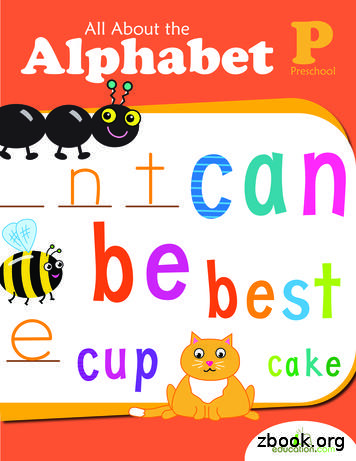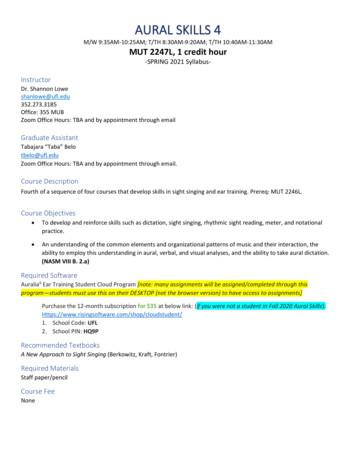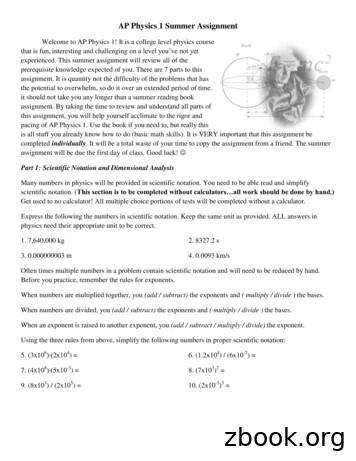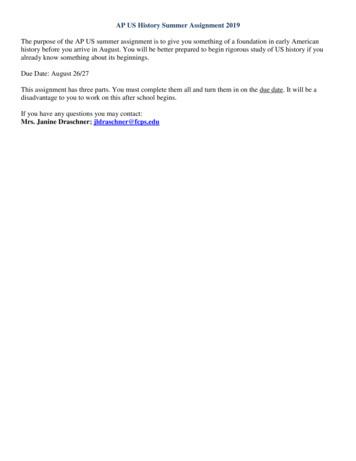Summer Reading Assignment: English 1 Honors Seminole Middle School Mrs .
Summer Reading Assignment: English 1 Honors Seminole Middle School Mrs. Marn Welcome to English 1 Honors! I’m excited about the journey we’re about to embark on. In order to prepare you for the level of rigor required in this 9th grade-level course, there’s a required summer reading assignment you need to complete. Should you have any questions, please contact me at: marnk@pcsb.org . This assignment is due by Friday 8/28. A copy of this packet is available in PDF format on my website: www.schoolrack.com/marn English 1 Honors is a high school credit class. Students’ grades become a part of their high school grade point average (GPA). If a student has successfully passed English 1 Honors this year, he/she will enter high school as a freshman and be placed in English II (Honors or Regular), a class predominately for sophomores (10th graders). This will eventually lead to a path of taking AP-level courses. This course is intended for high-achieving students with a serious approach to their studies. Students are expected to be mature readers, with exposure to high school-level texts. Please make sure you are registering for English 1 Honors. If you are registering for LA 3 ADV, you are NOT REQUIRED TO COMPLETE THIS ASSIGNMENT. Project Recommendations/Comments from Former Students -Don’t start this project too early. Give yourself time to read, grow, and learn over the summer. Be in the right frame of mind. -Don’t start this project too late! You DON’T want to rush on any work for Mrs. Marn. -Spell check, spell check, spell check! Mrs. Marn reads EVERYTHING! -Read the first 30ish pages of the book. If you don’t like it, choose another one. Make sure it interests YOU. -Buy the book and then highlight key passages OR use post-its to mark the key passages! - Don’t pick a book just because it looks “short” or reject a book just because you don’t like the cover! -I liked being able to do group discussions with people who were also passionate about the book they picked.
ACADEMIC HONESTY Cheating is claiming the work of others as your own. All student work must be original and not copied in any way from any other source, including print and computer/Internet sources. Proper citation and an accurate bibliography must accompany the use of language and/or ideas from outside sources. Under no circumstances should a student copy from another student, either by directly using the person's language or indirectly through the borrowing of unique ideas. Students are not allowed to use or copy someone else's answers, explain what was on an assessment to a student in another class period, nor are they allowed to share answers with anyone else. This is considered "cheating." Cheating includes: exchanging assignments with other students, whether it is believed the work will be copied or not giving or receiving answers BEFORE OR DURING tests or quizzes. (It is the student’s responsibility to secure his/her papers so other students will not have the opportunity or the temptation to copy). taking credit for group work when the student has not contributed an equal or appropriate share toward the final result accessing a test or quiz for the purpose of determining the questions in advance of its administration using summaries and commentaries (Cliff Notes, Spark Notes, etc.) instead of reading the assigned materials or for copying essays and responses texting a friend hints/clues about an upcoming assignment or assessment Plagiarism is a form of cheating. In this case, plagiarism happens most often when students are researching for information on topics in a class project or paper. Plagiarism is seen as a serious form of cheating that gives teachers a false view of a student’s strengths and weaknesses. It prevents further instruction in areas of weakness and delays the student in reaching his or her potential. Plagiarism includes: taking someone else’s assignment or portion of an assignment and submitting it as one’s own submitting material written by someone else or rephrasing the ideas of another without giving the author’s name or source presenting the work of tutors, parents, siblings, or friends as one’s own failing to properly cite sources used in writing a paper or preparing a project submitting purchased papers or papers from the Internet written by someone else as one’s own supporting plagiarism by providing work to others, whether it is believed it will be copied or not Consequences: The consequences may include: Re-instruction or review of proper research strategies and citations to avoid plagiarism. Students involved may receive a grade of “0” on the assignment, test, quiz, or project. This includes both the student who copied and the student who “shared.” Academic honesty is a big deal and cheating will not be tolerated! Plagiarism automatic zero.
Summer Reading Assignment: English 1 Honors Seminole Middle School Mrs. Marn Step 1: Choose a book Choose one book from below and read it. (Obtain through a local library or book store). Fast Food Nation Ender’s Game Brown Girl Dreaming Eric Schlosser Orson Scott Card Jacqueline Woodson Fahrenheit 451 The Book Thief Monster Ray Bradbury Markus Zusak Walter Dean Myers *Check my website: www.schoolrack.com/marn for short descriptions of each book to help you decide! Step 2: Reaction Paragraph First, write a reaction paragraph to your novel. This is not a summary. A reaction paragraph tells me your thoughts and feelings about what you read, and the impact the book had on you. This is personal, here. There is no “minimum number of sentences” required, however, make sure your paragraph is detailed and thorough. (You are in a ninth grade class, now—so keep that in mind!) Step 3: dialectical journal Using 20 quotes throughout the book, complete a dialectical journal. Rationale: The dialectical journal is a double-entry note-taking system. It allows you to gauge your own critical thinking and reading process. It offers you the opportunity to interact with and construct meaning of text. The term “dialectic” means “the art or practice of arriving at the truth by using conversation involving question and answer.” Think of your dialectical journal as a series of conversations with your book. The process is meant to help you develop a better understanding of the texts you read and provide direct feedback to yourself and the teacher on your thoughts and understanding. As you read, mark spots in the book that you feel are impactful (I’d recommend Post-In notes or little flag stickies). Jot down a quick note about your feelings here. You will expand upon these later. You should regularly reread your previous quotes and notes, drawing connections as you go. Keep in mind: a quote is not necessarily a line of dialogue. Any words contained within the text are fair game. Dialectical journals are not “interpretations” of the text, they are your conversation with it. Do not simply summarize/restate what the author is saying.
Instructions: How to do a dialectical journal 1. Draw a line down a sheet of lined paper, making two columns (about a 1/3 column on the left, 2/3 on the right). Left Side: ANCHOR SIDE Right Side: REACTION SIDE Direct lines from the text that “speak to you.” These are not necessarily quotes from characters, but simply any text that makes you react. . . think. . . take a pause. Include both the chapter number and page number. Your comments about the text on the left side. May Include: -Personal reactions—What are you feeling? -What the passage prompts in your thinking -Feelings about the words—What’s the impact? -Words or passages not understood/confusing and why -Words or passages you feel are important to the plot -Connections -Text to text: an insight gained through connecting the reading to other familiar texts -Text to self: a personal connection made between the text and your own life experiences -Text to world: a connection between the text and how the world/culture words. This goes beyond just personal experience -Feelings about the ideas, tone, and/or style of the text -Speculation about the significance of images that stand out in the text -Speculation about the theme(s) -Figurative language you think is particularly effective Sample Entry Text Title: “The Jacket” by Gary Soto Reference to the Text Response to the Text Pg 56 The mouth of the trash can reflects to the image of a monster eating “I hurled orange peels at the mouth of orange peels. When the boy is throwing orange peels into the trash an open garbage can, and when the can, I think it symbolizes that the jacket is peeling and that he wants peels were gone I watched the white to throw it away. puffs of my breath thin to nothing.” The “breath thin[s] to nothing” is used to show that the boy is watching his life disappear. I feel that even though he can do something about it, he doesn’t. In turn, he is throwing his life away. Pg 58 The personification of the clouds’ faces, “piled up and hurting,” “Finished, I went outside with my reflects the boy’s mood and view towards the jacket. jacket across my arm. It was a cold sky. The faces of clouds were piled up, The cold sky symbolizes that life isn’t fair, and it’s not going to give hurting.” the boy a break. The cold sky also shows that it is cold outside and that he depends on the jacket to keep him warm, even though he doesn’t want to depend on it. Pg 58 “I started up the alley and soon slipped into my jacket, that green ugly brother who breathed over my shoulder that day and ever since.” The clouds remind me of a time when I was in a bad mood—mad at my parents. It’s almost like the cloudy day set the stage for the huge fight with my parents about my cell phone. The metaphor and personification of the jacket, “that green ugly brother,” shows that the jacket is ghastly, but like a brother, it can’t be thrown away. I think this will change his life and show that he has given up. The fact that the jacket represents a “brother” shows how important that jacket is to Victory Maybe it represents poverty? Insecurity?
Grading 1. Journals will be evaluated on the quality of your response—so select passages that YOU want to write about. 2. Required reaction paragraph 20 entries. Simply read, think, and write. Be sincere in your writing. Use the suggested questions/ sentence starters below to help you. 2. Everything should be typed—size 12 standard font, although I will accept work NEATLY written in blue or black pen if no computer is available. I do not accept electronic copies emailed to me or assignments written in pencil or something other than blue/black pen. There will be a point penalty for this. 3. A cover sheet is required and must include: Your first and last name Title and author of book o Titles of novels are italicized 4. This project is worth 140 points. This will be a significant portion of your grade for the first quarter. 6 points per entry (2 for anchor, 4 for reaction): 120 points reaction paragraph : 20 points Questions & Sentence Starters to Assist You Optional questions that may help you/you may wish to consider as you read. Your answers would be the responses to the text you selected and go on the right side of your chart. 1. What does the passage mean or suggest to you? 2. Why do you think this is important—to you personally and/or to the whole text? 3. What confuses you about the passage? Why is understanding this passage important to your response to the whole text? 4. How does the passage connect to other ideas in the text? 5. How do you think the author feels about the ideas, events, or characters he/she is presenting? 6. If the passage suggests a problem, what solution(s) might exist? 7. What might have caused the problem? 8. Do the characters remind you of anyone else—in fiction, history, or your own life? 9. What is revealed about the character(s) through this passage? 10. How are the characters’ actions revealed? What do their actions tell you about their motivations? 11. How does this passage relate to other texts you have read? 12. How does this passage relate to your personal experience? 13. What words of art, music, dance, or movie does this passage remind you of? How? How does making this connection help you get more out of the passage? Sentence Starters 1. I wonder 9. I don’t really understand 17. Why did. . . 2. I began to think of 10. I disliked it when 18. How did. . . 3. I suppose that 11. I think the author intends 19. I agree with this because 4. I don’t see how 12. I think the author is trying to say 20. I disagree with this because 21. This event seems to be important 5. I like the idea 13. I am reminded of because 22. If I were (character) at this point, I 6. I noticed that 14. I can’t believe would. 7. I was surprised that/when 15. If I had been 23. This part doesn’t make sense because 24. The use of (figurative language) is 8. It is interesting that 16. It bothers me when. significant here because
Summer Reading Assignment: English 1 Honors Seminole Middle School Mrs. Marn Step 1: Choose a book Choose one book from below and read it. (Obtain through a local library or book store).
English II Honors-Havelock High School Summer Reading Assignment 2017-18 Welcome! As a student in Honors English II at Havelock High School, you are expected to complete a summer reading assignment. You may purchase the book or check the book out from a local library. Approach your reading as
2. When you finish reading, complete the Summer Reading Assignment Questions listed in this packet. 3. Complete one Summer Reading Activity Choices from the suggested list. 4. Bring your Summer Reading Assignment and Activity on the first day of school. 5. Students will present their Activity in class during the first week of school. 6. This .
Summer Reading Assignment Fourth Grade Summer is a great time to kick back, relax, and enjoy fun in the sun! It’s also a great time to dive into some great books! For your summer reading assignment, you will read three books: A non-fiction book of your choice, a fiction book of your choice, and a selection from the Must-Read list.
GEOG 1303 World Regional Geography World Regional Geography Signature Assignment . Course Assignment Title Assignment ID (to be assigned) Outcomes/Rubrics to be Assessed by the Assignment Assignment Description For this assignment students must analyze an issue related to world regional geography. Students will research the issue using .
All About the Alphabet Reading Alphabet Fun: A Reading Alphabet Fun: B Reading Alphabet Fun: C Reading Alphabet Fun: D Reading Alphabet Fun: E Reading Alphabet Fun: F Reading Alphabet Fun: G Reading Alphabet Fun: H Reading Alphabet Fun: I Reading Alphabet Fun: J Reading Alphabet Fun: K Reading Alphabet Fu
Week 8: March 1 st-5 th Dictation Assignment 6/Singing Assignment 6/Rhythmic Assignment 6 due by 11pm on Friday, March 5 th Week 9 : March 8 th-12 th Sight Singing and Rhythmic Sigh t-Reading Test 2 Week 10: March 15 th - 19 th Dictation Assignment 7/Singing Assignment 7/Rhythmic Assignment 7 due by 11pm on Friday, March 19 th Week 11: March 22 .
AP Physics 1 Summer Assignment Welcome to AP Physics 1! It is a college level physics course that is fun, interesting and challenging on a level you’ve not yet experienced. This summer assignment will review all of the prerequisite knowledge expected of you. There are 7 parts to this assignment.
AP US History Summer Assignment 2019 The purpose of the AP US summer assignment is to give you something of a foundation in early American history before you arrive in August. You will be better prepared to begin rigorous study of US history if you already know something about its beginnings. Due Date: August 26/27 This assignment has three parts.























